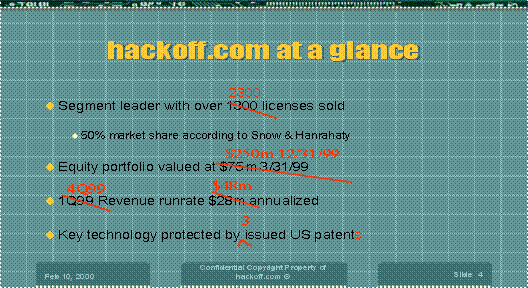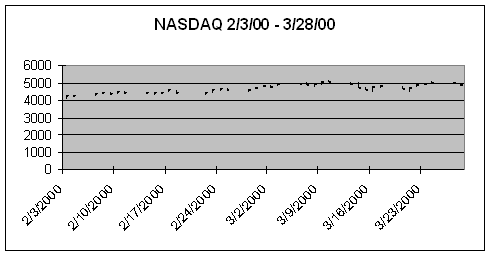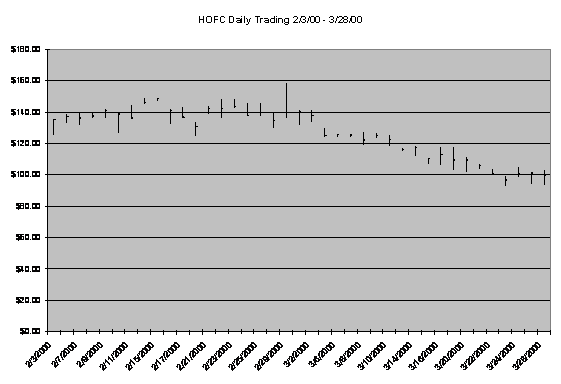Chapter 7 - The Secondary, February 3 - March 28, 2000 - Episode 1
Listen to podcast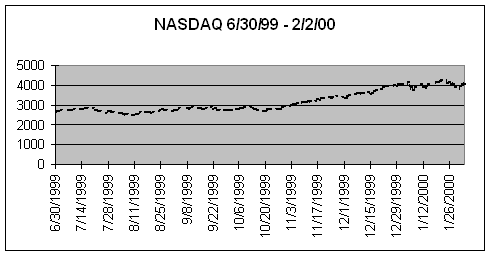
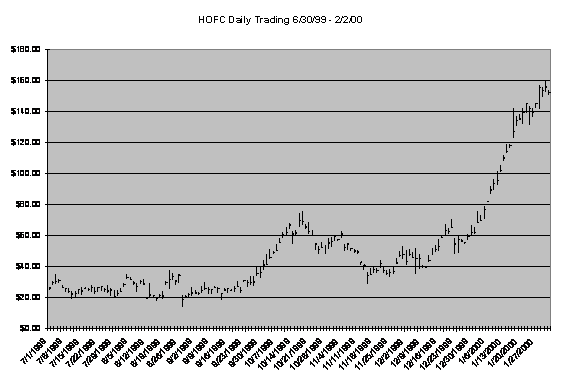
“Now I feel rich,” says Louise Lazard. She and Larry are on the Concorde at fifty thousand feet, streaking east to New York from London on their way back from Davos. They have to take the expensive Concorde because Larry has to negotiate this evening in New York and the logistics of leaving Davos by train didn’t get them to a major European airport in time to make any other connection.
“You should,” says Larry. “On paper, we’re worth over a billion dollars. What’s better, it actually looks like we’re going to get a down payment on that.”
Hackoff is planning to do a secondary offering at which the company will sell more stock. The offering is called a “secondary” because it is after the IPO which is, of course, the initial stock offering. In the IPO the company was the only seller of stock and the company got all of the proceeds (minus the seven percent that went to Barcourt).
In the secondary, the plan is for the company to sell one-and-a-half million new shares and for the founders, venture investors, and top management of hackoff to sell an additional 1.5 million shares for their own accounts. With the stock over 150 dollars per share, 1.5 million shares are worth 225 million dollars. If the secondary were to be done at this price, the company would raise an additional 225 million and the founders, investors and officers would split another 225 million.
The negotiation Larry has to take part in this evening is to determine exactly how much of the 1.5 million non-company shares each of the investors, founders, and officers will get to sell. Together, they own many times this number of shares so it may be a tough negotiation depending on how much each of them really want to sell. Naturally, everyone has been very cagey about his or her aspirations.
“Of course,” says Larry to Louise, “we can’t count on the stock staying at this price through the secondary. Barcourt says that the price of a stock usually goes down when a secondary is announced and it doesn’t always recover until after the secondary is done. Naturally, I don’t ever believe anything those self-serving sons-of-bitches say, so I checked some companies that have done secondaries and it looks like they’re right this time. So we shouldn’t count at selling at 150 or 160 dollars. Be nice though…”
“Why do stocks go down when a secondary is announced?” asks Louise.
“I guess a simple answer is that there is about to be more stock available to the market. Of course, the secondary gives us the chance to go out to all the mutual funds and do the pitch again, which we hope will create more demand. What Barcourt says is that the funds know they’re going to be able to get more shares in the secondary, so they slow down or stop buying in the open market and the price comes down some. Maybe true or maybe just something the bankers and the funds somehow arrange — self-fulfilling prophecy — so that the funds get a chance to get more cheap stock. It’s not like the IPO, though. Since we’re already public, the stock that the funds get is priced at just about where the stock closes on the day we close the secondary.”
“Yeah, you told me that,” says Louise. “But there’s part of it I still don’t get. Why don’t they just buy in the open market? Why should they order at all in the secondary if the price is the same as the market?”
“You’re really getting into this stuff,” says Larry, smiling. “Must be that being filthy rich gets your attention. Good question. I had to ask, too. Two answers I got: one, if they tried to buy a big quantity in the open market it would drive the price up, so they can’t really buy big at market price; the secondary lets them do that. Two, the sellers pay a commission in a secondary, but the buyers don’t, so they save on commissions. That’s pennies, but they do big volumes so it means something. I think the first reason is the real one. There may be one more reason the bankers didn’t mention: in the companies I looked at, the stocks did go down from the announcement of the secondary to the time it closed. Then it went back up — for three out of four of them — higher than it had ever been. So this is another chance for a fund to pick up a fast profit — even if it’s not as fast as an IPO.”
“But why don’t they just buy IPOs?” asks Louise. “They make a lot more money on them. Why bother with secondaries at all?”
“A few people have told me that there aren’t many good companies coming public any more,” says Larry. “There’s getting to be a lot of crap out there. I think the seventeenth online pet food company just announced its IPO. Online grocers are doing IPOs and no one has figured out how they can ever make a profit. The good companies like hackoff are already public. So I think they’d like to balance the new IPOs with some investment in seasoned companies like us that are already public. I don’t think you and I will want to put most of the money we get in the secondary into IPO stocks. But the bankers are all over me to do that.”
“To do what, Lar?”
“To buy a lot of IPO stocks with our new money,” says Larry. “Not that they don’t have lots of other ideas for how to manage our money for us. And complicated ways that we can really sell more than we’re selling but not look like we’re selling and, somehow, not violate the agreement we’ll sign with Barcourt that locks us up for a while from selling more.”
“Speaking of people who want to manage our money,” says Louise, “I got another call from my aunt at Merrill Lynch. She says she’s in their Wealth Management division and they can do a great job for us. She says we’re ‘high net worth individuals’ and that they specialize in managing the assets of high-net individuals who have had recent ‘liquidity events’ — I think that means ‘got a lot of money’.”
“She can get in line with all the rest of the bankers who are calling us,” says Larry. “Must be what it’s like to win the lottery. The phone at the office is one banker after another.”
“I can always tell one of their calls when I get them at home,” says Louise. “They ask for ‘Larry’. When I ask them ‘Larry who?’ they get flustered and mispronounce Lazard. Some of them, though, some of them say ‘Is this Louise?’ They must buy the first names somewhere.”
“That’s when I hang up,” says Larry.
“So, when I say I’m Louise or I’m your wife, they say ‘how is the weather in Atlantic Highlands?’ They all say that. Must be some book they read or something. Maybe there’s a law they have to say that. Anyway, we do have to listen to Aunt Hattie some time.”
Short interruption while Louise orders another drink from the ancient stewardess. Larry declines. He doesn’t drink before negotiating.
“So why should we listen to Aunt Hattie more than any of the other bankers who want to get their hands on our money?” asks Larry. “Second to your father, she was the foremost hater of my guts when I was in jail. Didn’t she want to get you exorcised or something?”
“Simple. She’ll tell my mother if we don’t. We don’t have to give her any money to manage; just listen to her.”
“She’s gonna be even more pissed off when we don’t give her any, I think,” says Larry. “We do her a favor if we don’t waste her time and listen because we already know she’s an idiot. But whatever you want; I always listen to rich ladies like you. As long as you really don’t give her any money to manage. And as long as I don’t have to talk to her before the secondary is done. I don’t know why, but that reminds me, did you get tickets for the Knicks next week?”
“I called Guido,” says Louise. “He says the game with Miami is really hard to get anything for. Everybody thinks Ewing is going to kill one of their players from the fight they had last season and everybody likes to come to the Garden to boo Pat Riley. He’s holding a couple of seats for us. Two- -fifty each and all the way in the back of the club section.”
“Shit,” says Larry, “I don’t want to sit that far back. He couldn’t get us anything behind the bench, even if we pay more? Those seats we had right behind the bench beginning of the season were great. You didn’t go cheap on us, did you?”
“That’s all he said he had,” says Louise. “He didn’t say he had anything better at any price. I didn’t ask him though.”
Larry starts to giggle.
“Larry, you’re giggling,” says Louise. “You don’t giggle. You’re not even drinking. Is something wrong?”
“No,” Larry just manages to choke out, “I … I just . I…” He can’t control his laughter enough to talk. He manages to blurt out: “We-could-buy-‘em!”
“I don’t get it,” says Louise laughing from contagion and also pounding Larry on as much of his back as she can reach in the small Concorde seats. “Larry, buy what? Are you okay?”
“Buy ... buy … WecouldbuytheKnicks,” he says in one fast breath and finally gets his laughter under control.
“What?”
“If we can’t get the tickets we want, we’ll just buy the Knicks. I think I read somewhere that the company that owns them would sell or just did sell or something for a little over 200 million. We can afford that. We’ll just buy them and we won’t have to worry about getting seats anymore.”
“Now I really feel rich,” says Louise. “Not sure I want to own Alan Houston, though.”
“You’re right,” says Larry. “Good thing you’re a knowledgeable fan AND a careful shopper. His contract is too rich for someone who won’t dribble. Guess we won’t buy them. Won’t really have the cash anyway. We’re not gonna get that much out in the secondary. Maybe they’d take stock though…”
“Stock’s too valuable to give them,” says Louise, drowsily. She falls asleep with a slight snore and a smile.
After a few minutes, Larry takes his computer out of the seatback pocket and starts to work a spreadsheet to use in the negotiation. He works until the descent towards New York begins.
There are two limos at Kennedy for the Lazards: one to take Louise and the bags back to Atlantic Highlands, the other to take Larry into the city for his negotiations.
“Good luck,” she says. “Don’t buy any sports teams without talking to me.”
“Right,” he says. “I love you.” He sounds distracted.
“You’re already negotiating,” she says fondly. “I love you too.”
coming back later, set blookmark here | display next episode now »







